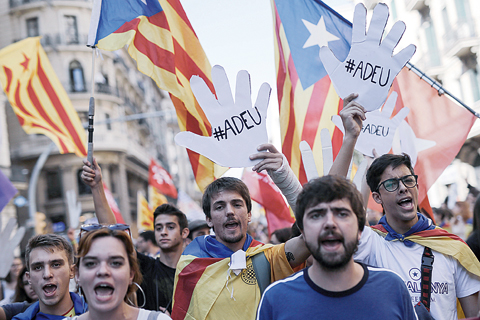Not clear whether the central government would back off

BARCELONA: Students hold placards reading 'good bye' as they protest during a demonstration. - AFP
BARCELONA: Thousands of Catalan activists protested in Barcelona yesterday as separatist leader Carles Puigdemont prepared to address the nation amid speculation he would back off from an independence declaration. Media reports said Puigdemont might dissolve parliament and announce fresh elections instead, to prevent Spain seizing control of the wealthy northeastern region following an outlawed independence referendum.
An address by Puigdemont, initially scheduled for 1:30 pm yesterday, has since been "suspended" without explanation. Spain's Ibex 35 of leading shares, though, leapt up more than two percent on the reports. Even though there has been no official confirmation that he will call elections, two Puigdemont allies have already resigned in protest.
"I don't agree with the decision to go to elections. I resign as MP and I will leave the @Pdemocratacat," tweeted Jordi Cuminal, a lawmaker for PDeCAT, Puigdemont's party. Thousands of pro-independence students and activists gathered in front of the regional government in Barcelona to the shouts of "independence." One banner read: Puigdemont, traitor."
In a day of sudden twists and turns, it was unclear whether regional lawmakers will meet as planned at 5:00 pm in a session many feared would lead to a unilateral declaration to break Catalonia away from Spain. At the same time, a Senate committee is scheduled to gather in the Spanish capital to work on a blueprint for seizing the region's political powers and finances in a bid to stop the independence drive.
The upper house, where Prime Minister Mariano Rajoy's Popular Party holds a majority, is due today to approve the measures proposed by the central government. They are intended to remain effective for up to six months. By yesterday, it was not clear whether the central government would back off if Puigdemont does abandon his independence drive and calls elections instead.
Anti-constitutional?
Puigdemont insisted earlier yesterday that seizing Catalan powers was an "affront" to Spain's constitution. The central government, in turn, accuses Catalan leaders of having breached the very same constitution by holding an independence referendum on October 1 -- an unregulated vote widely seen as the trigger for the current stand-off between the region and Madrid. The Constitutional Court ruled the vote illegal and contrary to the constitution, which states that Spain's unity is "unbreakable." Regional authorities say a majority of those who voted chose to break away from Spain. But only about 43 percent of eligible voters-some 2.3 million-turned out.
Independence or elections?
Polls have indicated that the region of 7.5 million people is deeply divided on independence. But Catalans are also fiercely protective of their distinct language and culture and their autonomy-which was restored after the repressive 1939-1975 rule of dictator Francisco Franco. The semi-autonomous region accounts for 16 percent of Spain's population and 20 percent of its economic output.
Some members of Puigdemont's executive urged him this week to avoid a full-on clash with Madrid by calling an early poll. On Wednesday, though, Catalan vice-president Oriol Junqueras had appeared to move towards declaring a break from Spain. He told Spanish television the government's unyielding stance was "not giving us any option other than defending the civil liberties of citizens through the best institutional instruments."
'Resistance'
Spain's Economy Minister Luis de Guindos acknowledged yesterday there could be "resistance" to Madrid's move to seize regional powers. Independence supporters have raised the prospect of rebelling in their workplace. "I hope that civil servants who are highly professional... will be conscious that any act against Catalan society will be negative," de Guindos warned on Spanish radio.
He added there had been "a drop in consumption and paralysis of investments" as a result of uncertainty sparked by the crisis. Yesterday, some 1,600 companies had moved their legal headquarters out of Catalonia. Observers fear the standoff will spark unrest in the region, where industry bodies say tourist bookings are already on the decline.
After the referendum on October 1, Puigdemont raised the stakes by announcing-and immediately suspending-Catalan independence. He defied various warnings and deadlines from Madrid, prompting the central government to turn to the never-before-used Article 155 of the constitution, designed to rein in rebel regions. It gives the government vaguely-defined and untested powers to act when the country's "general interests" come under threat. Catalonia is one of 17 regions, with varying degrees of autonomy, that make up Spain. - AFP










